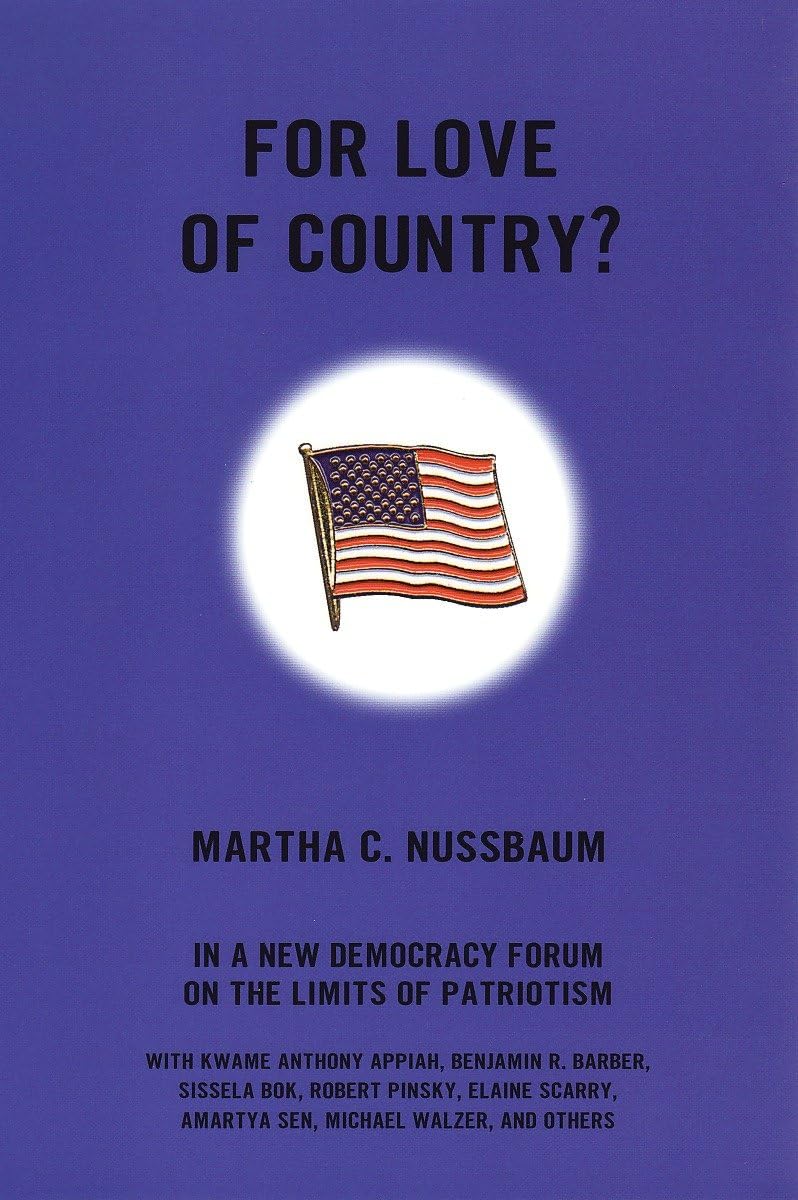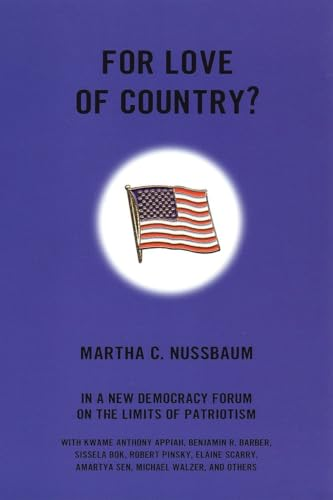Martha Nussbaum and Joshua Cohen (eds.), For Love of Country?


Martha Nussbaum and Joshua Cohen (eds.), For Love of Country? (Beacon Press, 2002)
One of the big things that either Trump or Musk or both have got up to since the recent Presidential inauguration in the U.S. has been the defunding and destaffing of USAID, the Federal agency responsible for dissemination of foreign aid around the world. According to the New York Times, the results of that initiative have already been quite dramatic:
- Most of the soup kitchens that feed 816,000 people in Khartoum have shut down.
- Patients were told to leave a U.S.-funded refugee hospital on the Myanmar border.
- Organizations that provide maternal care, vaccinations and firewood were forced to suspend operations.
- A U.S.-sponsored program collecting sensitive intelligence on Al Qaeda-related incidents has been interrupted.
- A U.S. contractor that provides security for a camp holding ISIS members and their families was forced to halt operations.
- Aid workers say about 40 newborns contracted H.I.V. per day when the U.S. stopped funding for antiretroviral drugs.
Way back in the before time, 1994 to be exact, philosopher Martha Nussbaum wrote a piece for Boston Review in which she pleaded with Americans to think beyond what she took to be “America First!” prejudices, and instead think of themselves as citizens of the world.* Her essay was accompanied by 29 replies, most somewhat skeptical. After the destruction of the trade towers in New York City on 9/11/01 resulted in considerable bellicose nationalism, it seemed to Beacon Press to be good time to re-release Nussbaum’s essay as a book, this time with 11 of the original responses, another five new ones, and a brief reply by Nussbaum. Nearly all the essays are under ten pages long, so in addition to being timely, the book is a quick and fascinating read.
As said, only a couple of Nussbaum’s respondents (Kwame Anthony Appiah and Amartya Sen) seem entirely sympathetic with her Thoreauvean take on this matter, although nearly all of them sympathize with her view that it is right to confer moral worth to everybody in the world, regardless of their accidents of race, ethnicity, nationality, religion, language, food preferences, etc. But her doubters think that “the world” isn’t the sort of thing of which one can be a citizen, and a number of them hold that the causal story of concentric circles of “first parents, then community, then polity, then others” has too many sticky effects to suppose that it can simply be pushed into the background. These writers generally hold that it is only through our local loves and laws that we can come to care about those of other nations, and a couple of them find Nussbaum’s dreamy “cosmopolitanism” unlikely to do much good because of the actual globalization of the world economy. It’s not that any of these respondents suggests that we ought to entirely disregard or even downgrade the value of the lives of those who aren’t our fellow countryfolk, but rather that most of the authors find “citizenship of the world” a hollow, if not entirely incoherent notion.
Nussbaum seems entirely unmoved by anybody’s criticisms, however, and this may be largely because, even back at the turn of the millennium she was acutely concerned about exactly those dangers that seem now to have come to pass in the U.S. She writes in her introduction to the 2002 volume that “our sense that the ‘us’ is all that matters can easily flip over into a demonizing of any imagined ‘them,’ a group of outsiders who are imagined as enemies of the invulnerability and the pride of the all-important ‘us.’” She warns, perhaps even correctly prophesies, that “compassion for our fellow Amerians can all too easily slide over into an attitude that wants America to come out on top, defeating or subordinating other peoples or nations….it too easily becomes a general call for American supremacy, the humiliation of ‘the other.’” In a word, she is very disheartened by chants of “U.S.A.! U.S.A.!”-- whether they are angry or proud.
Many of Nussbaum’s pleas are for changes to the way we educate our children. She pushes for a greatly increased focus upon cosmopolitan values, and for less attention to be paid to what she takes as parochial attachments. In her view, our models should be Marcus Aurelius, who taught “not to be a fan of the Greens or Blues at the races” and Rabindranath Tagore, who saw “Right” as “far greater than [his] country.”
What of her respondents?
For his part, Benjamin Barber doesn’t see much hope for Nussbaum’s program. He writes, “For the American everyman (every-woman), the representative poet is not Emerson but Whitman, not Thoreau but Woody Guthrie, bards who praise the handiwork of Lincoln and Roosevelt and who would have us travel together as comrades, drinking in the immediacy and the immensity of the American landscape.”
In her contribution, Sissela Bok, expresses worry about both the local and universal perspectives, warning of such ‘inner hypocrisy’ as she finds when considering Marcus Aurelius’s “inspiring reflections on cosmopolitanism, equality, and the love of one’s fellow human beings” at the same time as he was “overseeing intensified persecution of Christians voicing those very same ideals.” And she notes that Henry Sidgwick took the contrast between the two perspectives here to “threaten any coherent view of ethics.” As both views are important, Bok “sees no reason to teach children that claims to national or other identities are morally irrelevant”-- a view that she attributes to Nussbaum. For Bok, even if the customary move by children is “from part to whole,” when there is a conflict between the two, the claims of perspectives must always be weighed. There is no reason not to encourage children to explore their “local existence,” including their love for and pride in particular bonds, communities and cultures, especially when such attitudes may actually be necessary for gradually reaching beyond them.
Judith Butler seems share Bok’s views by claiming that “it is a mistake to declare one’s affiliation by stating an order of priorities,” but worries that “the meaning of ‘the universal’ is “culturally variable” and thus, contrary to Nussbaum’s piece, really has no “transcultural status.” After all, if a particular community “is constituted through racist exclusions, how shall we trust it to deliberate on the question of racist speech?”
Richard Falk’s take on this matter suggests that Nussbaum’s dichotomy of local and universal may not be sufficiently cognizant of global economics. He writes that “the shape of the world order can no longer be reduced to the relations between parts (conceived as states) and the whole (conceived as the world)....[because of] the new dynamics of essentially unregulated economic globalism.” Nussbaum’s view, he thus suggests, is not only not as progressive as Nussbaum seems to believe, but potentially harmful to goals of more equitable distribution of wealth.
Nathan Glazer faults Nussbaum for insufficient recognition that “the primary power to grant and sustain rights rests with constituted sovereign states….[because] commitments to others’ claims and rights involve costs [to a specific country] in money and lives.” And he finds it obvious that “whatever the inadequacy of our principled ethical arguments…we owe more to our family members than to others.” He concludes that any changes–for better or worse–will have to be mediated by actual nation states.
Amy Gutmann believes Nussbaum’s main mistake has been to take all shared national values as equal: Nussbaum “identifies as nationalistic the idea that a public education system should… dedicate itself to furthering liberty and justice for all. She then translates this idea into the advocacy of teaching national values, whatever they happen to be.” Gutmann agrees that democratic, humanistic values are what ought to be taught to children, but rejects the idea that our primary allegiance ought to be to ANY actual community. What is needed, she thinks, is a recognition of “the moral importance of being empowered as free and equal citizens of a genuinely democratic polity.” And, on her view, while we “need to be citizens of some polity to be free and equal,” it is abstract principles like democracy, justice, and freedom, rather than any particular community that should claim our fundamental allegiances.
Gertrude Himmelfarb’s objections to Nussbaum’s piece are mainly of the ‘psychological impossibility’ sort. As a teenager at the close of World War II, she had heard from a teacher that nationalism and ethnocentrism must now be finished once and for all. However, she soon realized that no such disappearance was occurring. Why not? Himmelfarb argues that cosmopolitanism’s denials of “the givens of life: parents, ancestors, family race, religion, heritage, history, culture, traditions, community, and nationality…are not ‘accidental’ attributes of the individual. They are essential attributes.” These, she insists, cannot somehow be ‘transcended.’
In his Burkean essay, Michael McConnell also insists that “humanity at large–what we share with other humans as rational beings–is too abstract to be a strong focus for the affections….Love cannot be directed toward ‘humanity’; it can be directed only toward real people, with whom one can have a real relationship.” Michael Walzer adds that he “has commitments beyond the borders of this or any other country, to fellow Jews, say, or to social democrats around the world, or to people in trouble in far-away countries” but he denies that these are “citizen-like commitments. For not only is he not a citizen of the world, there doesn’t seem to be anything like a world anywhere for which one can obtain citizenship.
In his piece, Hilary Putnam claims that Nussbaum confuses a PRETEXT for human aggression and cruelty with those activities themselves, and he denies that if we remove the pretext we will thereby eliminate those evil pursuits. “But,” he insists, “there is not the slightest reason to believe this.” After all, the USSR was supposed to be cosmopolitan and anti-parochial, but Stalin nevertheless killed as many as 50 million of his own people. Like Nussbaum, Putnam dismisses relativism, assenting to the claim that “there is such a thing as reasoning well about moral issues.” But he thinks that “actual reasoning is necessarily always situated within one or another historical tradition,” meaning that “we all have to live and judge from within our particular inheritances.”
Elaine Scarry worries that discussions of ‘the other’ “emphasize generous imaginings” and, in this way “allow the fate of another person to be contingent on the generosity and wisdom of the imaginer.” But this seems to her mistaken, because what all people really need is not the compassion of sensitive cosmopolitans around the world, but self-representation as memorialized in good constitutions. Appropriate laws may not prevent evil-doing anywhere, but they “at least objectify an aspiration.” And this “cannot be accomplished by a structure of sentiment.”
I think it should be noted that many of the differences found here may be characterized as moral. The dispute is largely over what is required by the best ethical standards. Should we be focused on our families, friends, country, etc. or on our love of humanity at large? Furthermore, they concern questions like whether our moral precepts are a function of our locality and upbringing and if morality can only be correctly described relative to a particular culture. Unsurprisingly, since these are longstanding, ‘heavyweight’ philosophical questions, there are distinct disagreements to be found among the authors on these matters. But what I myself would focus on here are the (ex ante) perceived prudential values involved.
What I mean is this: we find in today’s United States fundamental differences regarding foreign aid. Trumpians think such expenditures are generally bad. That money, in their view, is being wasted and should be either spent exclusively on Americans or simply returned to taxpayers. Others vehemently disagree. Their objections to such “America First” policies may reflect Nussbaumian cosmopolitanism or may instead focus on claimed benefits to America from helping other countries. On the latter view, elimination of foreign aid is just short-term thinking that is harmful to our very own nation in the long run.
What should a polity do when there are such clear differences in perspectives? My view is that we ought not to be as confident with respect to what morality requires of us as most of the participants in this book seem to me to be. Deeply held views of what constitutes the “just position” here may be little more than a kind of know-it-all paternalism. Instead, I think we should strive to be authentically self-governing by trying to fairly determine what the citizenry actually wants (whether we agree with the majority of them about this or not), giving each citizen’s view equal weight. Then we should do just what the majority instructs, for that is what real self-government requires. Sadly, because of numerous deep flaws in our crusty Constitution, we almost never try (nevermind trust in) any such processes. I mean, that would be democracy in action, and, well, we can’t have THAT. Much better to either let the scholars (cosmopolitan or not) decide what is best or turn the question over to those who currently have the power to do whatever the hell they want.
________________________
* Prof. Nussbaum has changed her views since 2002. Her more recent take on these matters can be found in her books Political Emotions (2013) and The Cosmopolitan Tradition (2021) in which, as she has informed me,“I now follow Grotius in giving the nation, and emotions directed at it, a central part in justice.”

About the Author
Walter Horn is a philosopher of politics and epistemology.
His 3:16 interview is here.
Other Hornbook of Democracy Book Reviews
His blog is here